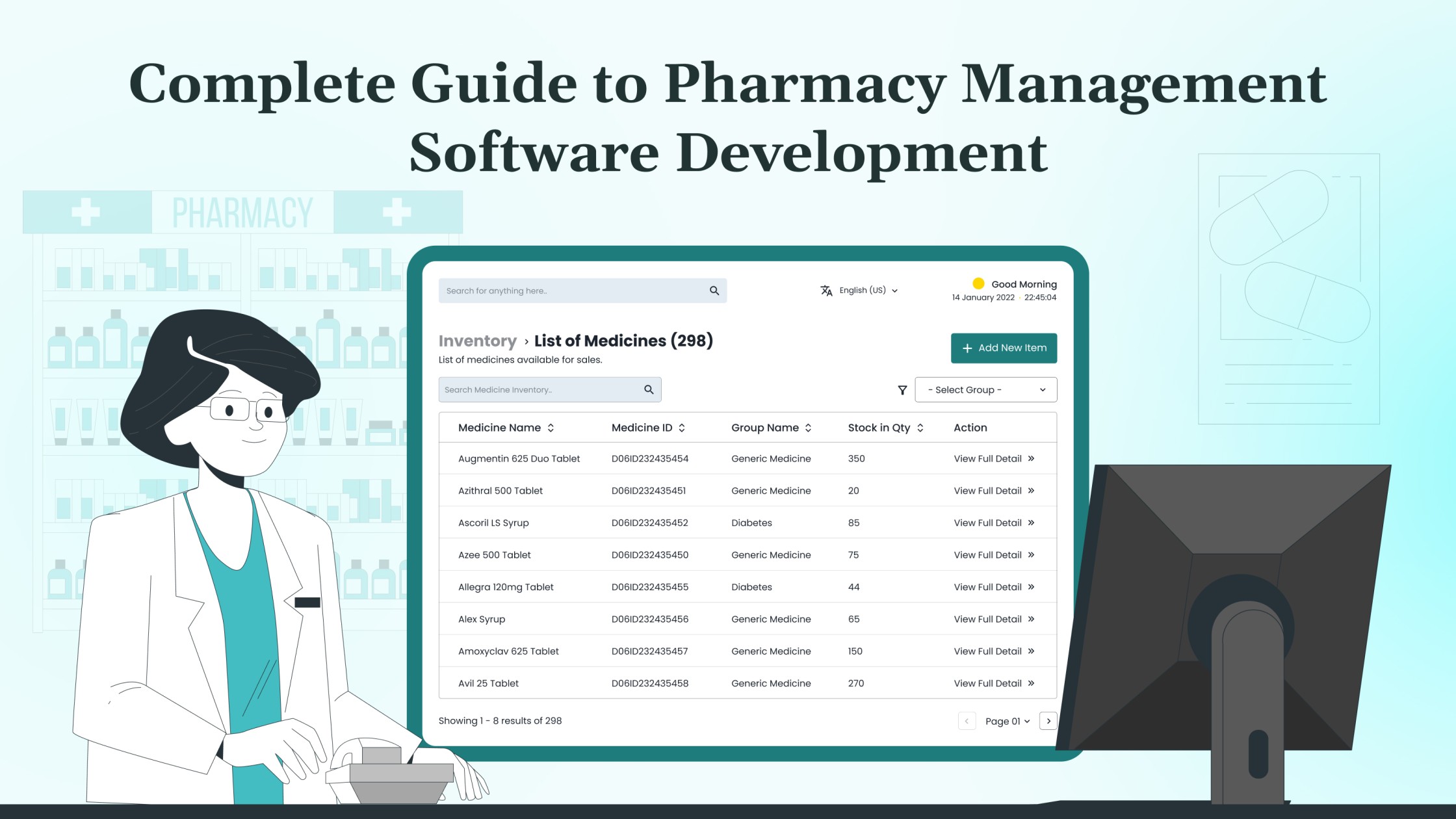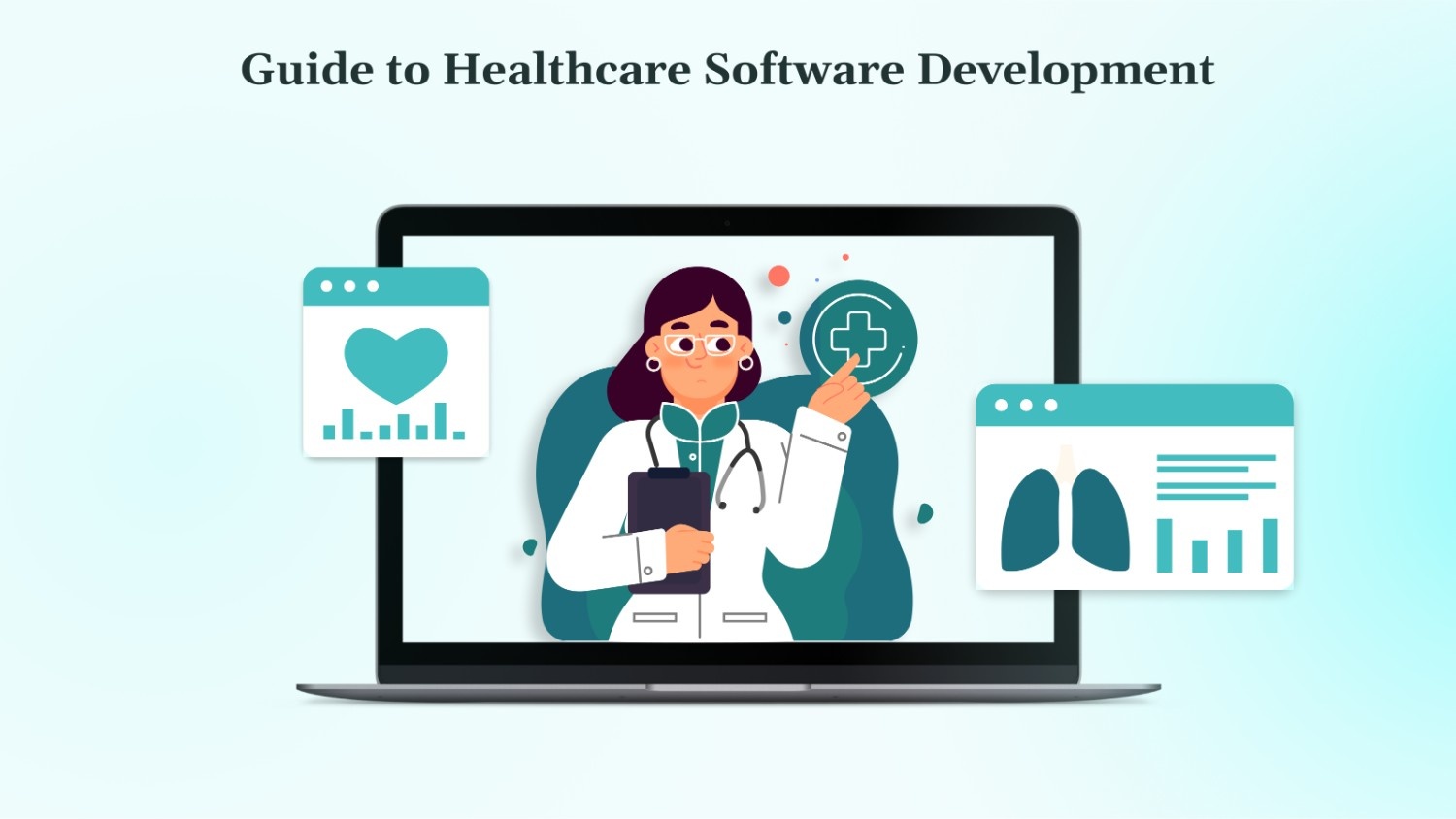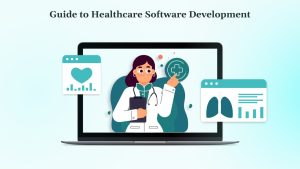Pharmacies today operate at the intersection of healthcare and technology, managing intricate prescription workflows, addressing data privacy concerns, and fulfilling strict regulatory obligations. The rapid evolution of this industry has made specialized digital platforms crucial for efficient and compliant operations.
Pharmacy management software serves as the backbone of modern pharmacies, automating critical tasks and centralizing daily processes to achieve better efficiency and improved patient outcomes. This guide examines the essential features, technical factors, and emerging trends that are shaping modern pharmacy systems. By providing a comprehensive overview, pharmacies can streamline operations, maintain compliance, and leverage innovation to deliver better patient care.
Key Takeaways
- Pharmacy management software helps pharmacies run smoothly by automating prescriptions, inventory, billing, and more, all while staying compliant.
- From real-time tracking to secure patient data handling, it is designed to reduce errors and boost efficiency.
- The market is booming thanks to cloud adoption, AI-powered insights, and patient-first trends like personalized medicine.
- Building a strong system takes more than good code. It requires the right tech stack, smart design, and security built into every layer.
- The right development partner can help you create a solution that fits your pharmacy’s unique workflows, supports long-term growth, and keeps patient care front and center.
What is Pharmacy Management Software Development?
Developers create pharmacy management software as a unified digital platform that integrates various pharmacy operations into a single, comprehensive system. They design modules to manage inventory tracking, prescription workflows, billing processes, compliance reporting, and analytics, all of which are connected through seamless data exchange.
A well-architected pharmacy software solution addresses the unique workflow requirements of pharmacies while ensuring scalability, security, and interoperability with external healthcare systems. This foundational development process lays the groundwork for building reliable, adaptable software that meets today’s regulatory demands and operational complexities.
Importance of Pharmacy Management Systems in Modern Healthcare
Pharmacy management systems are essential for running efficient health services. Pharmacies need to manage prescriptions, keep track of stock, handle billing, and stay compliant with regulations, all while working quickly and effectively.
As demand increases, pharmacies need platforms that can securely process complex transactions. Pharmacy management software simplifies workflows, reduces manual tasks, and connects smoothly with other healthcare systems.
At DEVtrust, developers create pharmacy solutions that allow care providers to concentrate on patients instead of paperwork.
Market Trends in Pharmacy Management Software
Rapid digital transformation is reshaping the pharmacy sector. The global market for pharmacy management systems is projected to reach USD 207.48 billion by 2030.
Key trends include:
- Cloud adoption: Real-time, scalable, and lower maintenance.
- AI-driven analytics: Improving forecasting and workflow automation.
- Integration with EHRs and insurance platforms: Enabling seamless care delivery.
- Comprehensive compliance: Automated privacy and audit features.
- Personalized medicine: Tools for pharmacogenomic-driven dispensing.
Forward-thinking platforms reflect these developments, offering features that anticipate regulatory shifts, AI applications, and omnichannel interoperability.
DEVtrust helps pharmacies stay ahead with software that reflects these evolving expectations, combining regulatory security with modern, scalable architecture.
Key Features of Pharmacy Management Software
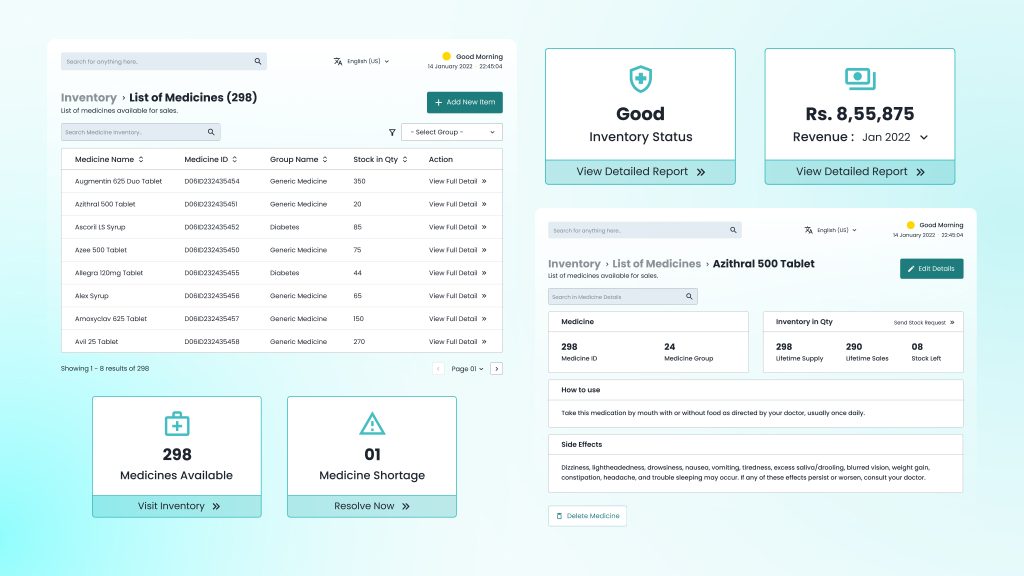
Effective inventory management is crucial for pharmacies to maintain optimal stock levels and minimize waste. Modern pharmacy management software offers automated, real-time tracking solutions that streamline these processes with precision.
Inventory Management and Tracking Capabilities
Accurate inventory tracking minimizes stockouts and waste. Smart solutions:
- Alert for low stocks and expirations
- Track batch numbers and lot details
- Automate purchase orders
- Sync with suppliers in real-time
Prescription Management and Processing
Efficient prescription handling reduces errors and enhances compliance:
- E-Prescribing and digital workflow approvals
- Automated verification for drug allergies and interactions
- HIPAA-compliant secure data storage and retrieval
- Integration with e-pharmacy and insurance services
Customer Relationship Management (CRM) Tools
Strong patient engagement leads to improved outcomes:
- Maintain prescription histories
- Personalized reminder services for refills
- Manage patient communication securely
- Loyalty and rewards program integration
Billing and Invoicing Functionalities
Streamlined billing improves cash flow:
- Automated insurance claims and co-pay processing
- Tax calculations
- Multi-channel payment support
- Invoice generation and digital records
Reporting and Analytics for Business Insights
Informed decisions require deep analytics:
- Real-time sales, inventory, and compliance dashboards
- Customizable business intelligence reports
- AI-driven insights for purchasing and demand trends
- Export and share functionalities
Integration with Healthcare Systems and Devices
Interoperability is critical in healthcare settings:
- Connects with hospital management systems, EHR/EMR platforms
- Interfaces with health insurance databases
- Supports barcodes, RFID, and IoT devices
Security and Compliance Features
Patient data protection is non-negotiable:
- End-to-end encryption for all transactions
- Multi-factor authentication
- Role-based access control
- Consistent with HIPAA, local and international standards
These features form the foundation of pharmacy operations. To bring them to life effectively, choosing the right technology stack and scalable backend becomes the next critical step.
Technological Requirements for Development
A pharmacy management system requires a technology framework that ensures scalability, security, and reliability. This foundation supports complex healthcare operations while maintaining regulatory compliance.
Selection of Appropriate Technology Stack
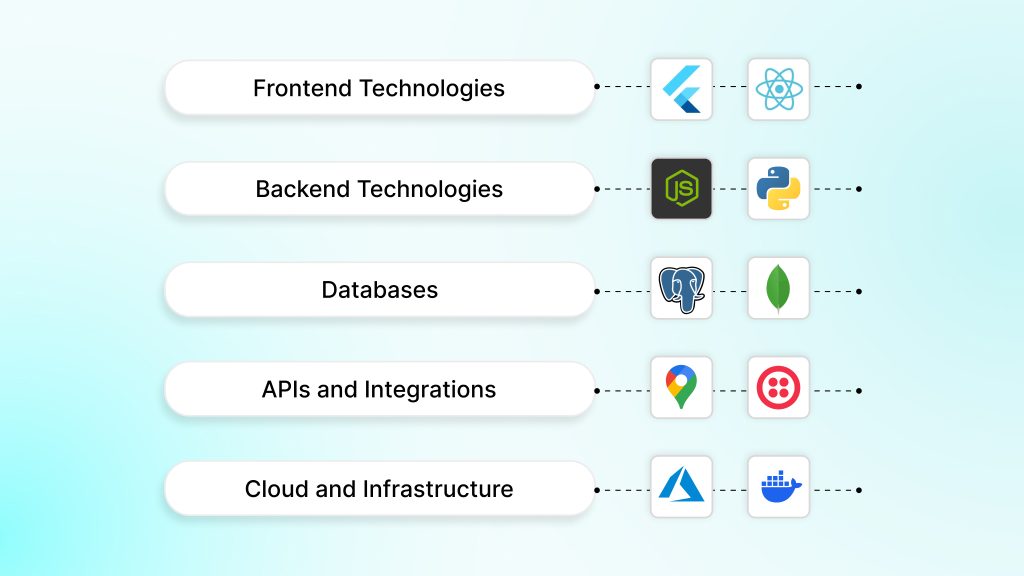
Selecting the right stack ensures longevity and performance:
- Backend: Node.js, Python (Django, FastAPI)
- Frontend: React, Next.js for responsive UIs
- Database: PostgreSQL, MongoDB for reliable storage
- APIs: REST and GraphQL for extensibility
- Cloud: AWS, Azure for scalable deployments.
Database Management and Architecture Considerations
Pharmacy systems handle sensitive, high-volume data:
- Role-based data access and audit trails
- Regular backups and disaster recovery
- Optimized schema for performance and regulatory retention
Scalability and Performance Optimization
Growth demands systems that perform under pressure:
- Load balancing and cloud auto-scaling
- Efficient transaction and message processing
- Minimal downtime during maintenance or upgrades
User Interface Design and User Experience Considerations
User experience impacts adoption and satisfaction:
- Intuitive dashboards and workflows
- Support for multiple user roles (pharmacists, admins, technicians)
- Accessibility for all users
- Responsive design across devices
Development Process
Developing a pharmacy management solution requires a structured, collaborative approach that aligns technical design with the real-world needs of pharmacies. Each stage, from requirements gathering to deployment, is carefully managed to ensure a secure, scalable, and user-friendly system.
Gathering Requirements from Stakeholders
Effective discovery aligns the software with real business needs:
- Workshops with pharmacists, managers, and staff
- Gather compliance and integration requirements
- Outline reporting and analytics needs
Planning and Designing Software Architecture
Well-architected systems withstand complex pharmacy workloads:
- Define module boundaries (inventory, billing, reporting)
- Create secure, scalable service blueprints
- Plan integration points for future needs
The architects at DEVtrust prepare architecture documents with clear, actionable plans.
Prototyping and Wireframing UI/UX
Early visualizations speed up development and reduce rework:
- Develop wireframes for all core screens
- Get end-user feedback on flows
- Iterate based on usability improvements
Implementation and Coding Best Practices
Quality begins with disciplined development:
- Automated unit and integration testing
- Consistent coding standards
- Secure secrets and credential management
Quality Assurance and Testing Procedures
Rigorous validation protects system integrity:
- Manual and automated QA testing
- User acceptance testing sessions with pharmacy staff
- Security assessments for data privacy
Deployment Strategies and Post-Deployment Support
Success continues after launch:
- Cloud-based rollout with zero downtime deployments
- Staff training and onboarding sessions
- Regular software updates and support
Clients receive comprehensive support packages that keep their platforms up to date.
Transitioning from process to pitfalls, the following are key challenges that can complicate pharmacy management software development.
Explore Web Application Development: A Complete Beginner’s Guide
Challenges in Pharmacy Management Software Development
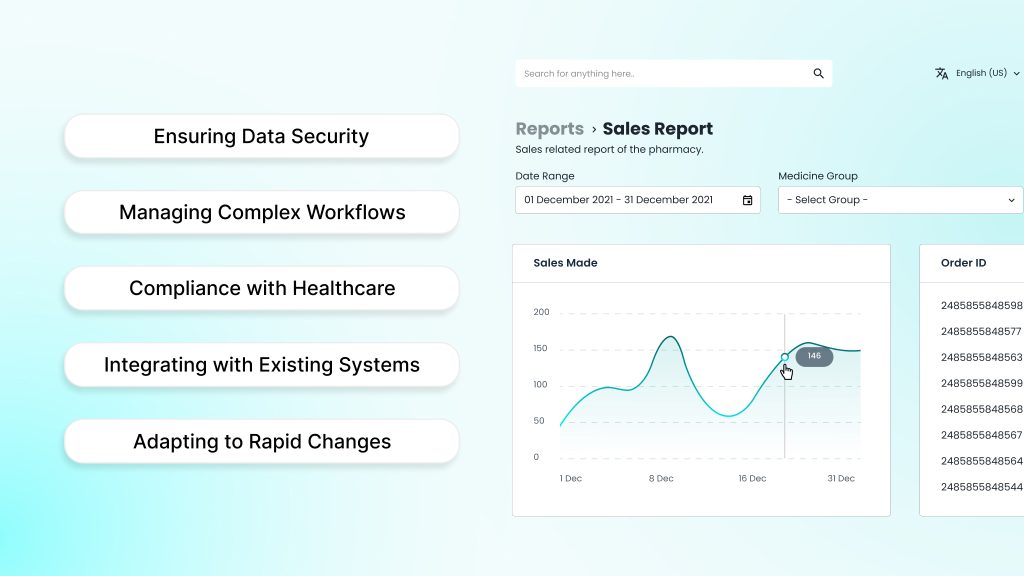
Developing pharmacy management software presents distinct technical and regulatory hurdles at every stage. Recognizing these challenges early helps teams design solutions that are secure, adaptable, and future-ready.
Ensuring Data Security and Patient Privacy
Protecting sensitive health and billing information from breaches is non-negotiable. Data must be encrypted, access tightly managed, and compliance maintained at all times.
Managing Complex Pharmacy Workflows
Each pharmacy may have unique routines for compounding, refills, and special orders. Customizable workflows and roles increase software adoption across diverse business models.
Compliance with Healthcare Regulations
Frequent regulatory changes require adaptable systems. Compliance modules should provide audit logs and exportable documentation upon request.
Integrating with Existing Systems and Technologies
Legacy systems complicate data exchange. Solutions must provide robust APIs and middleware to support interoperability and phased upgrades.
Adapting to Rapid Technological Changes
Cloud-native, modular architecture supports easy updates and integration of new tech, reducing future redevelopment risks.
Future Trends and Innovations
New technologies are transforming how pharmacy software operates, enabling faster and more personalized services. It’s essential for pharmacies to stay up-to-date with these changes to provide the best care for their patients.
Integration of Artificial Intelligence and Machine Learning
AI augments daily operations:
- Predict medication demand and optimize stock
- Automate insurance claim processing
- Power chatbots for patient inquiries
Development of Mobile and Cloud-Based Applications
Mobility and cloud capabilities are becoming essential:
- Access pharmacy data anytime, anywhere
- Real-time updates and collaboration
- Secure, automatic data backup
Personalized Medicine and Pharmacogenomics
Specialized care demands software support:
- Tailor medication recommendations to genetic profiles
- Integrate with labs and external databases
Enhanced Data Analytics and Predictive Modeling
Deeper analytics drive better decisions:
- Real-time dashboards for patient safety, inventory, and compliance
- Predict trends for medication stock and patient engagement
From advancing patient safety to powering pharmacy business growth, these trends will define the future of the sector.
Conclusion
Pharmacy management software is no longer a back-office utility. It has become a critical enabler of modern care delivery. From prescription accuracy to real-time analytics, the right platform supports operational efficiency, regulatory compliance, and a better patient experience.
Building such a system requires more than technical development. It requires a strategic blend of innovation, healthcare domain expertise, and a profound understanding of industry standards.
DEVtrust brings this comprehensive approach to each solution it delivers. With a focus on scalability, data security, and user-friendly design, DEVtrust helps pharmacies and healthcare providers successfully navigate the shift to digital care.
As the healthcare landscape continues to evolve, selecting the right software partner is crucial for staying ahead, enhancing workflows, and delivering safer, more personalized patient care.
Ready to modernize your pharmacy operations?
Connect with the experts at DEVtrust to build a custom, future-ready pharmacy management platform that meets your unique needs.
Complete Guide to Pharmacy Management Software Development
Build efficient pharmacy management software with robust inventory, CRM, billing, and analytics. Learn vital development insights. Click now!
Contact Us